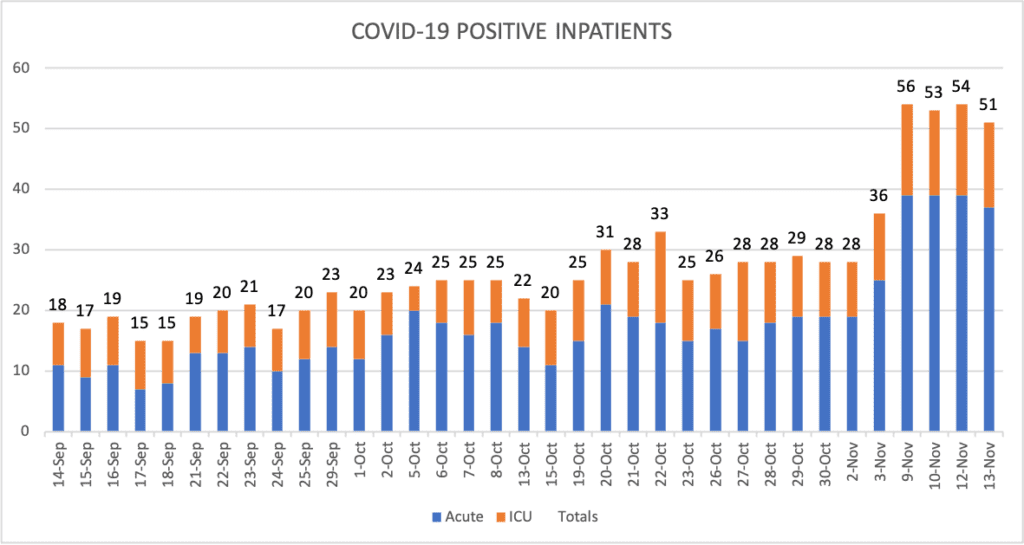Since the beginning of the pandemic, we have all been thinking about and preparing for what a fall/winter surge of COVID-19 would look like. Now it has arrived in full force. Just last weekend, the number of COVID patients at UW Medicine hospitals nearly doubled overnight. This is exponential – and unfortunately, only the beginning. People are tired. Tired of not being with their friends and family, tired of not socializing and engaging in normal behaviors. This fatigue is leading to lapses in mask wearing and, with the colder weather, an uptick in informal indoor social gatherings.
We have reached a critical moment in the pandemic, a moment for our community to get serious, to take action and respond in a coordinated and effective way. It is time to step up measures like masking and physical distancing – public health tools we know are successful in preventing further transmission and infection. The most important way to keep healthcare workers safe is to drive the community rate down. This is the work of everyone.
Having worked at the frontlines of the nation’s first COVID-19 outbreak this spring, we established aggressive safety protocols and procedures that we now know protected our staff and the greater community. This week, we established another new policy with guidance for addressing patients, support persons and visitors who either decline or are unable to wear a mask while at UW Medicine facilities. UW Medicine offers reasonable accommodations, in compliance with the Americans with Disabilities Act (ADA) and Washington Law Against Discrimination (WLAD) requirements, to those who are unable to wear a mask or face covering. Please see the full policy details here.
To keep our hospitals functioning over the coming months, we must stick to the actions that we know work. Ultimately, we need to be able to maintain essential access to care – not only for patients with COVID-19 but for those with other basic and urgent care needs as well. The last thing we want is to reach a point where we must make tough decisions that would take an even greater toll on our hospitals and clinics, our patients and the economy.
Below is the current COVID-19 activity summary for UW Medicine, as well as local, national and global epidemiology numbers. These data help illustrate the surge we are experiencing, especially in our region and nation.
UW Medicine COVID-19 Activity Summary

Local/National/Global Epidemiology
King County: Public Health – Seattle & King County is reporting 32,570 total cases and 826 deaths as of Nov. 12. Approximately 3.4% of all tests performed are positive, and the number of new positive tests is currently at 212/14 days/100,000 people. As of Nov. 12, the effective reproductive (Re) number was estimated to be 1.2 (estimate range: 0.6-1.7).
Washington: The Department of Health reports 123,356 cases and 2,416 deaths as of Nov. 11. Of the 2,694,170 people who have been tested, 4.6% have been positive.
United States: The Centers for Disease Control and Prevention reported 143,000+ new cases yesterday, 10,314,254 total COVID-19 cases and 241,069 deaths.
Global: The WHO COVID-19 Dashboard reports 52,487,476 confirmed COVID-19 cases and 1,290,653 deaths.
We now have more medical therapeutics and scientific knowledge about COVID-19 than at any point in this pandemic, yet people are still getting sick, ending up in ICUs and dying at record numbers. COVID-19, while serious, is a preventable illness exerting unnecessary impacts on our healthcare systems and our community as a whole.
We know what stops the spread of COVID-19, but we all still must actively work at it and avoid the temptation to give up. Now is the time to plan for a small, household only, Thanksgiving (Thursday, Nov. 26) and Native American Heritage Day (Friday, Nov. 27).
We have flattened the curve before, and we can flatten it again. Thank you for stepping up and sticking to what works together and at a distance.
Sincerely,
John Lynch, MD, MPH
Medical Director, Infection Prevention & Control
Associate Medical Director, Harborview Medical Center
Division of Allergy & Infectious Diseases, UW School of Medicine

